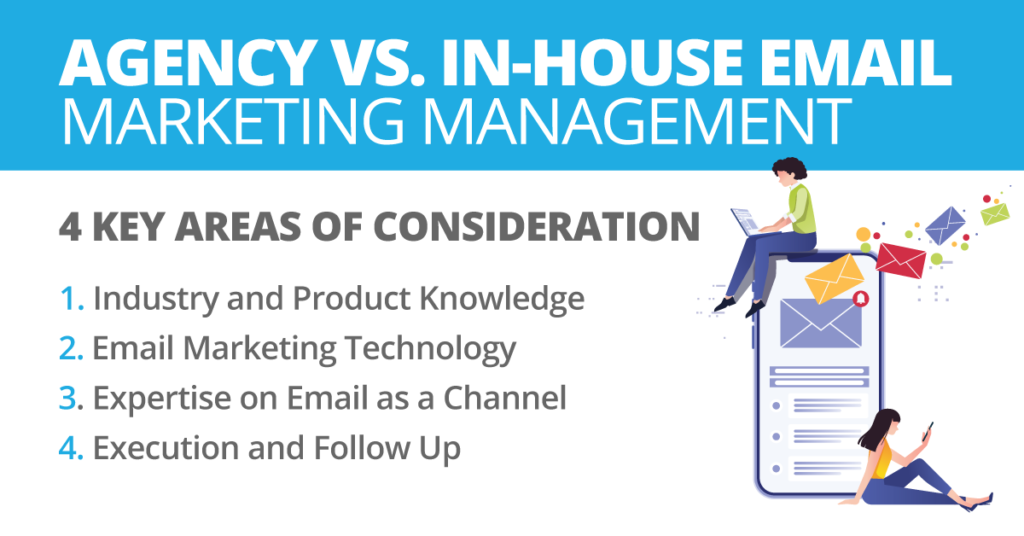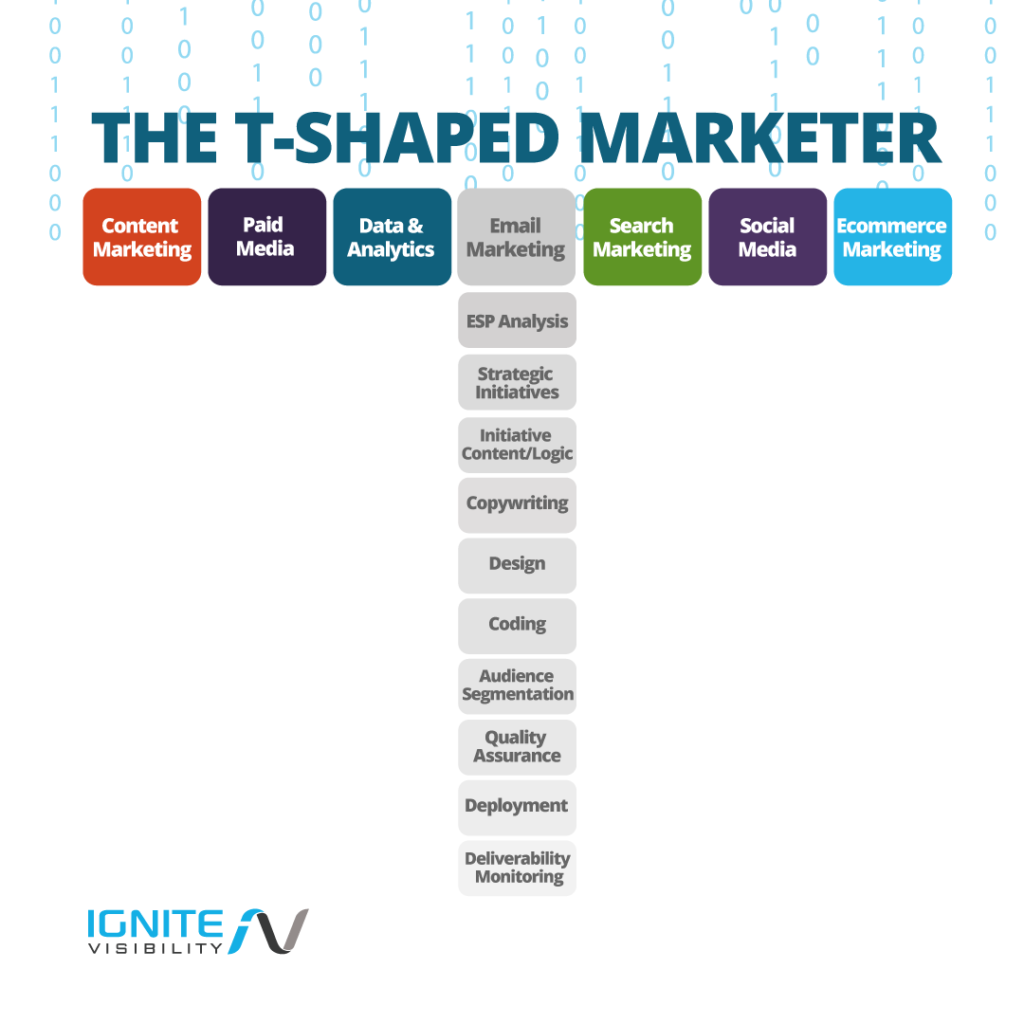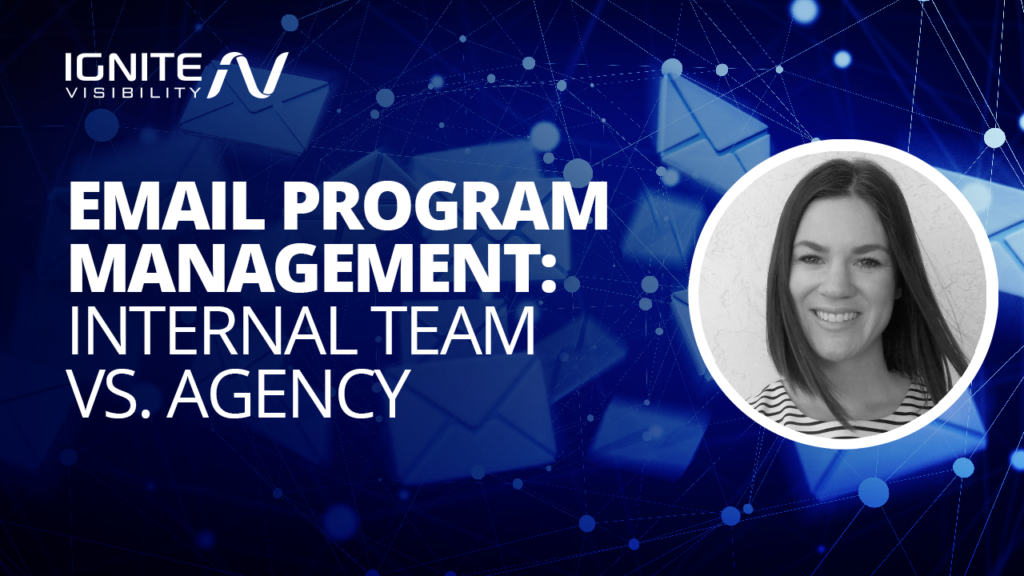When an email marketing campaign delivers successful results, it feels like a completed jigsaw puzzle with no missing pieces—but the route there isn’t always seamless.
I’m Lauren Rugge, Email Marketing Strategist at Ignite Visibility. Email marketing management isn’t standardized. Some opt for an in-house team while others choose to hire an agency. Which is right for your program?
Agency vs. In-House On the Issues: The Email Marketing Management Rundown
Determining whether to go internal or agency starts with differentiating all factors of an email campaign. There are four key considerations that can help you make your decision:
- Industry and Product Knowledge
- Technology Involved in the Email Marketing Management Process
- Subject Matter Expertise on Email
- Campaign Execution and Follow Up
Let’s dive into these considerations a bit further.

Agency vs. In-House: Email Marketing Management
1. Industry and Product Knowledge
Operating any marketing campaign for your company requires a deep understanding of both your industry and the product or service you offer. Your offering is unique, the better someone understands it the better they can curate the messaging to be effective for the target audience.
Email marketing varies by industry. The B2B space, for example, tends to have a very different email program strategy than B2C or ecommerce. What day and time of the week should you send your email? Should it be text-based or designed? What’s the look and tone of the brand? These are questions one needs to take into consideration when planning out an email strategy. You can break it down even further based on the business model, marketing funnel, and customer journey.
In this context, there are pros and cons on both the agency and internal sides of the equation.
RELATED: 11 Tips For Effective B2B Email Marketing In 2019
Agency:
Agencies have the benefit of maintaining a large pool of content writers and designers with diverse backgrounds working with many different industries. They’re able to pull from these resources based on your needs, or even hire new writers who have the necessary experience to tackle the task. Agencies also tend to have access to current research on the industry and competition, which means you’ll improve the quality and performance of your email campaigns.
On the other hand, agencies may not have as intimate of a relationship with the product or audience as an internal team might. This is something that develops over time from the onboarding phase throughout a long-term agency relationship.
Internal:
An in-house email team focuses solely on the company and its offerings. They should have a close relationship to the product and brand. Depending on how niche your business is and how long your email marketing manager has been with the team, you may find this to be a preferred method.
If you have to hire new employees in order to form a dedicated email team, they may not be as connected to the product and industry as you might hope. And there is always a ramp-up period to be taken into consideration.
2. Email Marketing Technology
Email marketing technology (Martech) is plentiful and complex. There are many different email service providers (ESPs) to choose from, such as Klaviyo, Pardot, Mailchimp, the list goes on and on. There are also numerous platform integrations and seemingly endless new tools constantly coming out to help serve the approximately 4 billion email users and help you optimize your ROI.
Agency:
An agency has the capacity to select email managers from a pool of talent. These email experts can recommend the right ESP for your business model. Not only that, but they can ensure that you’re dealing with an expert who’s well-versed in that particular ESP. Some agencies may even have partnerships with various ESPs to provide their clients with top-notch support and discounts.
It’s the agency’s job to stay up-to-date on the latest tools to improve email program management. That’s a lot of time to dedicate to in-house skill development, but an agency’s functionality is built around it.
Internal:
Again, an internal team’s sole focus is on your company. However, deciding on the right ESP and third-party tools can be difficult, time-consuming, and ultimately expensive.
That’s not to mention the process of getting buy-in and approvals from executives. There’s also the learning curve of getting up to speed using a new platform—understandably, it takes time, but you need to decide if that’s the time and money you’re willing to spend. Your marketing team may already be stretched too thin to stay updated on new email technology.
3. Expertise in Email as a Channel
Not all digital channels are created equal. Email is its own beast, and a subject matter expert on all things email is a good way to go.
Of course, there’s more than one way to be an expert, so it depends on what your team vs. an agency can bring to the table.
Agency:
In a full-service digital marketing agency, you’ll find an email department (like mine!) that’s totally dedicated to email as a channel. These departments are solely focused on strategic email planning, execution, and reporting.
For example, an email team of experts at an agency is what’s called a T-shaped marketer. This is an individual or team that has a deep knowledge in all parts of email program management. Before narrowing down to email, here’s a visual of a T-shaped email marketer:

The T-Shaped Marketer
- ESP analysis
- Strategic initiatives
- Initiative content/logic
- Copywriting
- Design
- Coding
- Audience segmentation
- Quality assurance
- Deployment
- Deliverability monitoring
That’s a lot of expertise wrapped into one, which can be a huge pro on the side of agencies for email marketing management.
Internal:
In an in-house environment, a marketing team is often stretched thin. They’re trying to juggle many different marketing channels. Oftentimes, these teams are more generalist in nature—or they’re V-shaped marketers who could be struggling in the email space.
It’s really hard to keep up with the ever-changing technology and strategic best practices in all channels.
4. Execution and Follow Up
Planning, creating, and deploying a campaign is only half the battle.
Reporting and optimizing are two key steps that are often given less weight in the planning phase. For example, are you using tools to test your deliverability rates? If not, there’s a good chance a portion of your emails are going to spam. Are you testing times and days of the week for your sends, subject lines and CTA button placements? If not, you’re missing an opportunity to optimize your ROI.
So where does the agency vs. in-house team stand on this final step of the email process?
Agency:
An agency has the benefit of understanding best practices for a robust testing program and access to the many reporting and analytics tools to continuously optimize your email marketing program. The sheer nature of an agency means they’re eliminating many of the risks associated with internal work. For example, there tends to be less internal friction due to team members taking critical feedback personally. With an agency, you can simply critique the work until it’s ready for approval and deployment.
With a set of steps in place to handle clients and complete high-quality work, an agency tends to deliver more streamlined processes overall.
Internal:
Whether for email marketing or another initiative, Internal teams can be complex. There’s the process of selecting a dedicated team full of people who often already have their plates full. When it comes time to get the job done, everyone will have their input, which can create bottlenecks in getting the campaigns out the door.
That’s not to say it’s all rocky terrain in house. It can be easier to make last-minute changes with a team you already manage. They’re more likely to respond to you on the fly and be able to hop on the revisions at a moment’s notice if it’s prioritized.
The Bottom Line? Either Way, Invest In Email Marketing
Whether you go in-house or hire an agency, don’t skimp on email marketing.
Across industries, email tends to deliver higher conversion rates than organic search, social media, and direct marketing. The average conversion rate for email is 4.29%. Meanwhile, the average ROI is $42 for every $1 spent, according to Litmus.
The point is: an internal- or agency-led email campaign will deliver results, as long as you do it right.
If you don’t have the resources to pour into an in-house team, you may want to consider forming a relationship with a trusted agency to help you with email marketing management. You’ll want to get the highest return, and it’s important you’re honest with the resources you can dedicate to a successful email marketing program, and how much you can (or are willing to) give to your subscribers.

